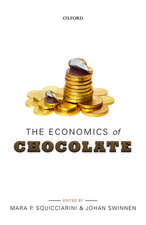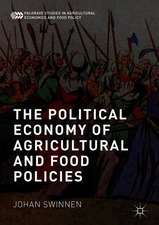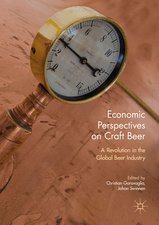Beeronomics: How Beer Explains the World
Autor Johan Swinnen, Devin Briskien Limba Engleză Hardback – 7 sep 2017
Preț: 105.56 lei
Preț vechi: 126.43 lei
-17% Nou
Puncte Express: 158
Preț estimativ în valută:
20.20€ • 21.06$ • 16.79£
20.20€ • 21.06$ • 16.79£
Carte disponibilă
Livrare economică 17-22 februarie
Livrare express 13-19 februarie pentru 46.76 lei
Preluare comenzi: 021 569.72.76
Specificații
ISBN-13: 9780198808305
ISBN-10: 0198808305
Pagini: 208
Dimensiuni: 143 x 223 x 24 mm
Greutate: 0.39 kg
Editura: OUP OXFORD
Colecția OUP Oxford
Locul publicării:Oxford, United Kingdom
ISBN-10: 0198808305
Pagini: 208
Dimensiuni: 143 x 223 x 24 mm
Greutate: 0.39 kg
Editura: OUP OXFORD
Colecția OUP Oxford
Locul publicării:Oxford, United Kingdom
Recenzii
Highly recommended, this book isnt a dry tome. Its essential reading for those turned on by history, economics, fun facts and, erm, beer.
If you care about beer and its impact on our world, Beeronomics is a smart and entertaining primer on the subject, that deserves its place in any beer lover's library.
This book is aimed at serious students of economics and business -- it's more investment strategies and market consolidation than tales from the pub. But even in the analysis, there are interesting moments.
Don't be put off by the allusion to economics; there is only a moderate amount of economics in this wide-ranging book, and most of it will be easily understood by the average reader ... All of it, no matter how far afield it seems from economics, will be put to work proving the author's thesis that beer explains the world ... you don't have to be a specialist to enjoy this book. The chapters are short - usually about eight pages - and they are well-written and understandable.
This impressive, all-encompassing, and accessible book is a tour de force and must-read for anybody interested in history, economics, and obviously beer. Cheers!
For much of human history beer was central a safe source of fluids, calories that fed the work force, and tax revenues that reshaped the political world. Monks, generals, scientists, kings, and robber barons are all part of the books journey that ends with craft beer. A must on all business schools list of case studies and your holiday gift list!
Beeronomics: How Beer Explains the World is a significant book. It covers diverse aspects of the economics of beer in world history, providing fascinating reading for beer enthusiasts and others alike. Each chapter is a revelation. Drawing it all together leaves us with a much changed view of this wonderful, historically important beverage.
For several years now, Jo Swinnen has been devoting serious scholarly attention to a neglected topic, and uncovering intriguing stories along the way. Finally, these insights are made available to a broader public in this refreshing read.
This is a fascinating book on beer, history, and economics by the leading beer economists from the world's beer capital. In fifteen chapters, Swinnen and Briski tell the story of how the world has shaped beer and how beer has shaped the world.
Beeronomics provides an excellent addition to the literature. It addresses and explores multiple aspects and issues related to beer and brewing worldwide, using several interesting approaches to highlight new trajectories and trends in the field. Definitely worth a read!
If you care about beer and its impact on our world, Beeronomics is a smart and entertaining primer on the subject, that deserves its place in any beer lover's library.
This book is aimed at serious students of economics and business -- it's more investment strategies and market consolidation than tales from the pub. But even in the analysis, there are interesting moments.
Don't be put off by the allusion to economics; there is only a moderate amount of economics in this wide-ranging book, and most of it will be easily understood by the average reader ... All of it, no matter how far afield it seems from economics, will be put to work proving the author's thesis that beer explains the world ... you don't have to be a specialist to enjoy this book. The chapters are short - usually about eight pages - and they are well-written and understandable.
This impressive, all-encompassing, and accessible book is a tour de force and must-read for anybody interested in history, economics, and obviously beer. Cheers!
For much of human history beer was central a safe source of fluids, calories that fed the work force, and tax revenues that reshaped the political world. Monks, generals, scientists, kings, and robber barons are all part of the books journey that ends with craft beer. A must on all business schools list of case studies and your holiday gift list!
Beeronomics: How Beer Explains the World is a significant book. It covers diverse aspects of the economics of beer in world history, providing fascinating reading for beer enthusiasts and others alike. Each chapter is a revelation. Drawing it all together leaves us with a much changed view of this wonderful, historically important beverage.
For several years now, Jo Swinnen has been devoting serious scholarly attention to a neglected topic, and uncovering intriguing stories along the way. Finally, these insights are made available to a broader public in this refreshing read.
This is a fascinating book on beer, history, and economics by the leading beer economists from the world's beer capital. In fifteen chapters, Swinnen and Briski tell the story of how the world has shaped beer and how beer has shaped the world.
Beeronomics provides an excellent addition to the literature. It addresses and explores multiple aspects and issues related to beer and brewing worldwide, using several interesting approaches to highlight new trajectories and trends in the field. Definitely worth a read!
Notă biografică
Johan Swinnen is Professor of Economics and Director of the LICOS-Centre for Institutions and Economic Performance at the KU Leuven, Senior Research Fellow at the Centre for European Policy Studies (CEPS) and a Visiting Scholar at the Centre for Food Security and the Environment (FSE) at Stanford University. He is a Fellow of the AAEA and the EAAE, was President of the International Association of Agricultural Economists (2012-2015) and is President of The Beeronomics Society. He was previously Lead Economist at the World Bank (2003-04) and Economic Advisor at the European Commission (1998-2001), and has been advisor to many international organizations and governments. He holds a Ph.D from Cornell University, and has published widely on agricultural and food policies, political economy, institutional reform, trade, global value chains, and standards.Devin Briski is a print and audio journalist focusing on food, ideas, and technology. She serves as content marketing manager for the events team at Vox Media, which produces Code Conference and Vox Conversations. She is also host of the podcast One Mans Trash about the collectibles market. Devin began her career in Silicon Valley, where she worked on the publishing and marketing team of Stanford Social Innovation Review and co-founded online magazine The Ventured Life. She holds a bachelors degree in sociology and a master's degree in journalism, both from Columbia University.





















